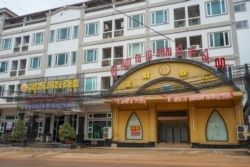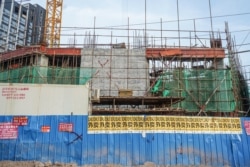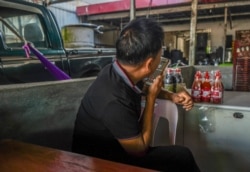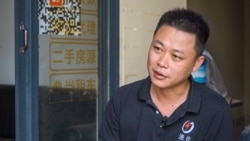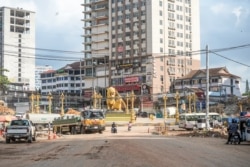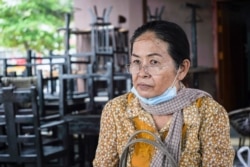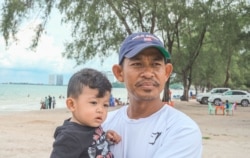Chhin Eng remembered when Preah Sihanouk province’s Sihanoukville airport was nothing more than an airstrip. In 2005, when he first moved to the coastal town, there was little business activity and the Kang Keng airstrip had few flight arrivals or departures.
The last three years have seen an exponential increase in air travel to Sihanoukville, largely aided by the increase in casino and construction activity. Dozens of flights arriving at the town’s airport, at least 20 a day from Chinese cities, were keeping Chhin Eng busy in his Lexus RX-300 SUV.
“When the Chinese started coming, I could make up to $100 every day,” he told VOA Khmer in late May.
In 2016, Chinese President Xi Jinping’s visit to Cambodia overlapped with the onset of a massive increase in Chinese investments into Cambodia, a lot of it heading straight for Sihanoukville. These investments were directed towards casinos, online gambling, and tourism-related infrastructure projects, including housing.
In just a few years, the town was being transformed from a backpacker haven, laced with Russian criminal elements, into the promise of a new, more metropolitan city. From 2016 to August 2019, Chinese inflows of investment into Sihanoukville peaked at about $2 billion, according to the Cambodian Development Council.
With the numerous casinos dotting the city, online gambling ticking away and construction activity moving along speedily, the Cambodian government in 2019 ordered a ban on online gambling starting January 2020 – an extension of China’s crackdown on outflows of illicit money, especially via casinos and online gambling operations.
Provincial authorities reported a significant decrease in Chinese nationals starting January, who at the peak of Chinese business activity numbered around 200,000 individuals. Authorities have never been forthcoming about the exact number of Chinese nationals in the city, with state institutions making different estimates.
The novel coronavirus pandemic then further exasperated an already-precarious situation, leaving the city in a standstill. Cambodia’s first positive case was also reported in Sihanoukville, with another cluster of cases among a French tour group in March.
On a recent trip, reporters saw several unfinished condominiums and high-rise buildings and little to no construction activity. Multiple small businesses and shops, many fitted with Mandarin signage, were shuttered and under-construction streets had no traffic jams, previously caused by tourist buses and construction vehicles.
Approved foreign direct investment inflows have slowed down in the interim, according to the World Bank, and even after China lifted its COVID-19 travel restrictions local government officials said there is no certainty if Chinese business owners and workers will return to the city.
Cambodian residents, and the few remaining Chinese nationals and businesspersons, spoke to VOA Khmer about their concerns and apprehensions over Sihanoukville’s uncertain economic prospects, many wondering if this was the new normal for the coastal city.
In late May, Chhin Eng was tipped off about a flight with tourists was arriving at the airport. The taxi driver rushed to the airport in his SUV, only to see the long line of Chinese tourists boarding buses and minivans pre-booked by a local Chinese-owned tour company.
“I am jobless and having nothing to do at home,” Chhin Eng said, before getting into his SUV for the 45-minute drive back to the city center.
“I decided to come here today... betting on the chance that I could pick up a customer. But I could not get any.”
Chinese business owners and nationals told VOA Khmer they were not very optimistic about the current situation. Many had come to Sihanoukville believing that it could be turned into a vibrant city, like the many dotting China’s industrialized provinces.
But the double-blow of the online gambling crackdown earlier this year and the global viral pandemic, have left investments and businesses in limbo.
Chinese national Lau Zhu moved to the port city 12 months ago and started a small business, where he became an intermediary between other Chinese businesspersons and local officials.
The Zhejiang province native, who is married to a Cambodian woman, admits that a lot of his work involved the facilitation of “tea money”, as well as consulting newcomers on their operations.
With several land purchase agreements in his hand, Lau Zhu spoke of how business was profitable when there were 300,000 Chinese nationals in Sihanoukville, which was his estimate of the Chinese population in the city.
“They came here and rented houses, guest houses, and hotels, so it was great for the business,” he said, speaking of the arrival of Chinese nationals since 2016.
“But with no online gambling, the 300,000 people all went back suddenly,” he added. “So, it is not good for business anymore.”
Speaking at a press conference on June 9, Preah Sihanouk Governor Kuoch Chamroeun said there were around 15,000 Chinese nationals remaining in the town, attributing the quick exit of people to the COVID-19 outbreak. He did not give an estimate of how many Chinese nationals were in the city at the start of the year.
Ye Zuo Rui, a 35-year-old Chinese national, is one of the few who has chosen to remain in Sihanoukville. He migrated from Guangdong province’s Shenzhen city, following other Chinese business owners who were taking a gamble on moving to a new country.
Incidentally, Finance Ministry Secretary of State Vongsey Vissoth, speaking at a meeting to discuss Cambodia’s macroeconomic management in February, said the government hoped to turn the town into a “second Shenzhen.”
Back at his office, Ye Zuo Rui said he started a car garage, catering to both Chinese and Cambodian nationals, after realizing that he could provide a faster service than existing car-repair businesses. Seizing on the property boom, he also runs a real estate brokerage service.
“Everyone came here because they saw the light,” he said, as his staff gathered to hear his insights into the current situation.
He said that business activity was currently at its lowest, since he moved to Sihanoukville in 2018, and that he was losing “thousands of dollars” a month because real estate sales had dried up.
“In the current situation, not losing money is good enough, let alone talk about earning income,” Ye Zuo Rui said, despondently.
With the current economic slump, the Chinese national said there is little keeping him in Sihanoukville, except for the initial hope that had drawn him to the port town – to build a new city in Cambodia.
Ivan Franceschini, a post-doctoral fellow at the Australian National University, said the situation in Sihanoukville was grim, especially for Chinese and Cambodian workers, many of who were struggling to make a living.
“For many Chinese workers, the dream of Sihanoukville had turned into a real nightmare, as they were stuck there, unable to collect enough money to fly back to China or trapped,” he said, in an email this week.
Prime Minister Hun Sen on June 1 made a visit to the city’s newly-paved boulevard connecting downtown Sihanoukville to the international airport, winding along the province’s southern coastline.
The road is part of a 300-million dollar infrastructure road project, which the government said it is funding from the annual budget. Hun Sen said he envisioned the city as a “multi-purpose commercial hub” and a development model that could be replicated across the country.
Franceschini said the Cambodian government was attempting to rescript the Sihanoukville story and steer its development to be modeled on Shenzhen, but it was unclear if this would be possible.
“It remains to be seen if these experiments will work, if there will be enough investment from China and elsewhere to support them,” he said.
“[A]nd most importantly if Sihanoukville will recover from the blows that the wild development of recent years has inferred to its attractiveness as a tourism and investment destination.”
With the dramatic changes Sihanoukville has undergone over the years, Cambodian residents were hopeful the adverse impacts of increased investment from China, including the inward migration of Chinese workers and criminal activity, were a thing of the past.
Cambodian residents have been resentful, especially on social media, of being priced out of their homes and businesses, forcing many to leave the town or move to the outskirts. Chinese nationals and businesses were able to pay higher rents for shops and apartments, with landlords profiting from this new clientele.
Additionally, the casino and online gambling operations had attracted some Chinese criminal elements, with local police reporting an increase in kidnappings, extortion, and murders involving Chinese nationals in the city.
In August 2019, the Chinese Embassy in Phnom Penh issued a warning about the rising crime in the southern port city. In the travel advisory, it asked Chinese citizens to refrain from gambling activities or from venturing out at night, warning of “chaos” and “insecurity.”
“In view of the special circumstances in the relevant region, if Chinese citizens still insist on going out [in the town], it may cause the parties to face a higher security risk and may affect the effectiveness of obtaining assistance,” the advisory in Mandarin read.
Shortly after, Prime Minister Hun Sen ordered the end of online gambling, starting January 1, 2020, a move that immediately received the endorsement of the Chinese officials.
The Chinese Embassy in Phnom Penh did not respond to a request for comment.
According to an April study by the Washington-based United States Institute of Peace, a large number of Chinese businesses and triad networks moved to Myanmar’s Karen state, after Cambodian and Chinese law enforcement cracked down on these activities in Sihanoukville.
Cheap Sotheary, the provincial coordinator for local rights group ADHOC, has lived in Sihanoukville for 30 years. After giving up a teaching job in 1990, she relocated to the port city and said she had witnessed the various iterations of the town, starting from the influx of United Nations forces under UNTAC.
She was critical of the casino and gambling operations in the city, blaming it for the increase in crime, which was a new development for the long-time resident.
“The [gambling] industry was the main driver of crimes involving Chinese nationals,” she said. “You had never seen as many kidnappings, shootings, torture and confinement cases as you did [recently].”
She was not against investment and development that benefited the city, but wanted authorities to take advantage of the current economic lull to plan and regulate such activities.
Near O’Chheuteal Beach, which is popular among Cambodian families, Lao Harry was enjoying a seaside picnic with his wife, Kong Leakena, and two young children.
Kong Leakena speaks a little Mandarin and used to work at a local casino, but lost her job after gambling establishments were ordered closed once Cambodia started to see an increase in novel coronavirus cases in March.
She wanted local authorities to ensure social protections for Cambodian residents of the town, so that they were not affected by the downsides of foreign investment-dependent development.
“The authorities just need to implement absolutely strict legal enforcement [with tourists and investors] to protect the locals and make the city more livable for them,” Kong Leakena said.
For Lao Harry, who grew up in the town, he distinctly remembers his elders always expected Sihanoukville to develop like Hong Kong, a waterfront, developed city.
“Now it gives me a feeling that we seem to be on the way there,” Lao Harry said. “But it may not be possible without the Chinese.”





